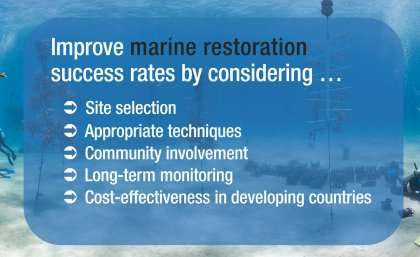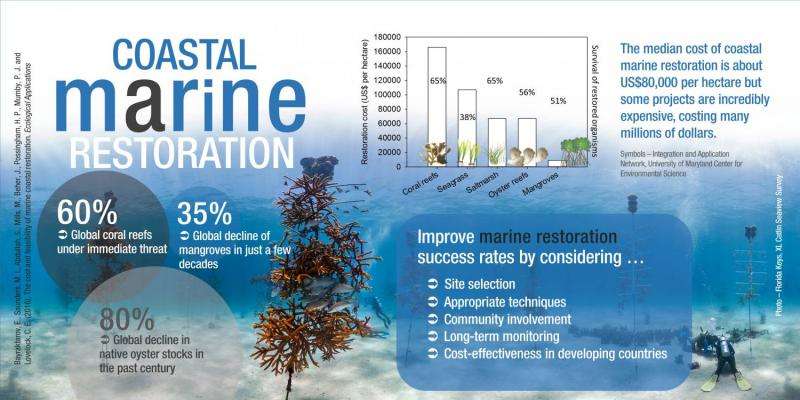Researchers release 'ultimate guide' to coastal habitat rejuvenation

Researchers have distilled 40 years of coastal marine restoration studies into a set of powerful guidelines for anyone hoping to rejuvenate coastal habitats.
University of Queensland Global Change Institute postdoctoral research fellow Dr Elisa Bayraktarov said the new review was backed by 40 years of research, and could help stakeholders and decision-makers improve their conservation planning in all things marine coastal restoration.
The review addressed uncertainties about restoration, cost and feasibility, which can hinder decision-making, she said.
"Our study has been released at a time when the world is grappling with the realisation that coral reefs, seagrass beds, mangroves, saltmarshes and oysters are rapidly disappearing – this before even adding climate change into the mix," she said.
"Owing to factors such as urbanisation, changing land practices, pollution and unsustainable fishing, more than 60 per cent of the world's coral reefs are under immediate threat.
"Climate change has led to a natural disaster for the Great Barrier Reef with more than half of the corals dying in some regions after unprecedented mass coral bleaching in 2016.
"Mangrove forests are being removed across the tropics for conversion to aquaculture and forest clearing, agriculture and urban development are also having a devastating impact."
Dr Bayraktarov said although it was clear the world desperately needed to better manage its coastal regions, this was the first time scientists had assessed the cost and feasibility of coastal restoration programs on a global scale.

"We reviewed and analysed results from 235 projects and made nearly 1000 observations for restoration of coral reefs, seagrass, mangroves, saltmarshes and oyster reefs," Dr Bayraktarov said.
"This information will be made available to support decision-makers, planners and researchers in evaluating the cost and feasibility of marine coastal restoration.
"It's important for local authorities to realise that even the most basic coastal restoration will have a median cost of US$80,000 per hectare.
"Tremendous benefits come from knowing what has worked best in the past and how to avoid restoration failures in the future."
The researchers found that restoration success often did not depend on the amount of money spent but rather on ecosystem type, site selection and technique used.
"Investment in restoration projects in developing countries can achieve up to 30 times more unit area of habitat than in developed countries for the same cost," Dr Bayraktarov said.
"People in developing countries often depend entirely on coastal marine ecosystems for food and other ecosystem services they provide. It was surprising to find a dearth of data on restoration projects there.
"Most marine and coastal restoration projects have focused on developed countries and in particular Australia, Europe and USA.
"Data from developing countries are urgently needed, in particular for seagrass, saltmarsh and oyster reefs, given that large numbers of people rely directly on the goods and services provided by these systems."
More information: Elisa Bayraktarov et al. The cost and feasibility of marine coastal restoration, Ecological Applications (2015). DOI: 10.1890/15-1077.1
Journal information: Ecological Applications
Provided by University of Queensland



















